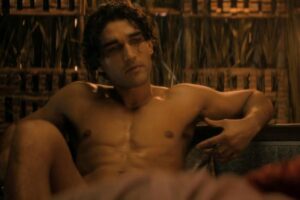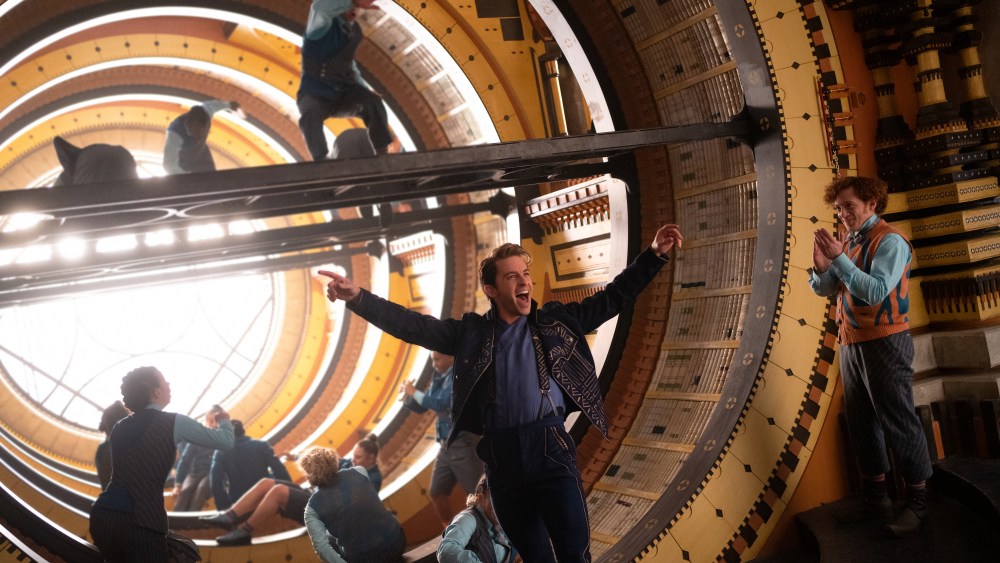Production designer Nathan Crowley has been waiting his entire career for a film in which he could build an entire fantasy world. He found that with “Wicked.”
When director Jon M. Chu called on him to work on “Wicked” for the film adaption of the Broadway musical, Crowley’s dream came true. “Jon wanted it to be fantastical. He wanted it to be joyous. He wanted it to be happy, and the Emerald City had to be this magical myth of the place that everyone wanted to get the ticket to.”
Shiz University is where much of the action takes place. The theory behind it was Shiz — like Oxford, Cambridge, Ivy League universities and even Hogwarts — was that it is an ancient institution, one that few were fated to attend. Crowley needed it to feel timeless and magical. “I had to find a new look that isn’t just dark stone,” says Crowley.
His other challenge was answering the question of how does one get to Shiz? “We can’t go by train; that’s the wizard’s technology and it belongs to him. We can’t go by balloon, and we can’t go by car because cars don’t exist,” explains Crowley.
The solution? The ancient tradition of water. Water was also a factor in the Wicked Witch of the West’s story — remember, “I’m melting!” — so it was fitting.
Crowley built the waterway using tanks and the grand archway leading up to Shiz. The boats were made in Prague and brought to the United Kingdom, where the film was shot.
Constructing Shiz’s grandeur was a combination of exteriors such as the water tank, arrival docks and the entrance to the university. He used different materials such as stone and wood and mixed architectural languages, with Shiz’s courtyard paying particular homage to American architecture. “The big arch is there because it’s an American fairy tale. I used the ‘White City of Chicago’ as inspiration.”
Shiz University was built on a backlot.
Those exteriors were seamlessly combined with the interior sets that had been constructed on soundstages. The dorm room, for example, needed to feel intimate yet big enough for a dance number. The space had to be interesting with the idea that Glinda didn’t want to share her room.
The domes in the room were inspired by the Brighton Pavilion in the South of England, a Georgian-inspired former royal residence with high windows. Crowley enhanced the room with wood varnish and murals that were over-detailed. “You don’t feel it because you’re interested in the character.”
Special effects and set dressing teams also came in to fill the room with hat boxes and shoe boxes that sprung open. “There’s an enormous amount of mechanics under the floor,” says Crowley.
One thing that wasn’t scripted was the hallway which Glinda dances down at the end of “Popular.” So, he built one. “Glinda comes running down the hallway at the end, and it’s a beautiful moment.”

The intimate dorm room.
Giles Keyte
As simple as it looks, Crowley knew it was still a big dance number with lots of movement. So, he worked closely with the film’s choreographer, Christopher Scott, to lay out the set. “We looked on the space and action and how we could tell the story within ‘Popular,’ and what would happen within this confined space.”
Shiz Library was another accomplishment for Crowley. It was a giant space for the students, with rotating bookcases that spun seamlessly and giant wooden arches.
The set was pivotal to Fiyero’s (Jonathan Bailey) entrance. “He’s supposed to be the coolest guy ever. Everyone’s in love with him. We’re going to dance through life with him, and he’s going to sweep people off their feet, so we have to give him a place that architecturally keeps up with him.”
Crowley thought about ‘Royal Wedding’ and Fred Astaire dancing around a rotating room. “I want Fiyero to dance in that.”
So he built a miniature model with the help of special effects to show everyone what he was envisioning. “I thought, ‘They’re never going to go for it.’ [But] Jon loved it.” He added, “I said to Jon, ‘If they all spin individually, and he’s dancing and jumping and spinning, why couldn’t the Oz bookshelves be round?’”
Crowley points out, “When the ladders line up because they spin independently, you get an O and a Z.”
Read the full article here








